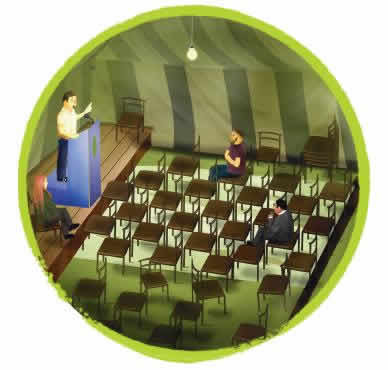
You’ll do yourself and the planet a favour, writes Tom Hodgkinson, a keen advocate of the Lying Around in Fields Society
Lying around in fields seems to me to be an eminently practical and enjoyable way to promote your chosen issue, whether it be peak oil or climate change, because by lying around in fields you are doing no harm whatsoever to the planet.
I had a wonderful summer speaking at festivals, meeting people, and hearing their stories. For example, at Shambala, a wild family festival in Northamptonshire, I met people who had been involved in the recent Climate Camp at Heathrow. I was speaking at an area called Rebel Soul, whose organisers had pulled together a wonderful programme of speakers and music, including Peter Harper of the Centre for Alternative Technology and the
But there was one question that niggled me, and it was the question of failure. I got the sense that many of those involved in Climate Camp had been disappointed at their low turnouts. One audience member felt that those involved should be doing more to push the agenda. He found the fact of the low numbers dispiriting.

I agreed that sometimes it worried me that the history of Utopian schemes seems dotted with failure. From the Diggers to D.H. Lawrence, and from John Ruskin’s communal set-ups to the living experiments of Clive Ashbee or Edward Carpenter, none of the ideas could be said to have succeeded in terms of longevity. Something always seemed to go wrong. The founders would fall out and the project would crumble away.
However, in another sense Climate Camp or Ruskin’s St George’s Guild could be said to be great successes even if small numbers were involved and the time frame was short, for the simple reason that they opened dialogue and expanded the minds of those involved and the minds of the far greater number of people who read about them or heard about them or talked about them. All demonstrate the wonderful nature of possibility. These experiments have an influence that stretches far beyond their immediate scale. When we hear the stories of courage of the people who quit their jobs to go and live in tents or trees, it inspires us to make changes in our own lives.
Even to talk in terms of failure or success doesn’t make much sense, because who is making the judgement? If we talk of failure then we may be making the danger of slipping into using the same language as the ‘enemy’, with its targets, PowerPoint presentations, philosophy of limitless growth and a crazy lusting after quantity rather than quality.
who is making the judgement? If we talk of failure then we may be making the danger of slipping into using the same language as the ‘enemy’, with its targets, PowerPoint presentations, philosophy of limitless growth and a crazy lusting after quantity rather than quality.
Modest projects may have an unexpectedly large influence. Another group I met at the festival, as I was sitting in the sun on a straw bale outside a fantastic mead bar, was the Lying Around In Fields Society. Lying around fields seems to me to be an eminently practical and enjoyable way to promote your chosen issue, whether it be peak oil or climate change, because by lying around in fields you are doing no harm whatsoever to the planet and you are undoubtedly doing yourself a whole load of good. Through that simple act, you are connecting yourself with the earth and giving yourself time to reflect. I think the Lying Around in Fields Society is a great antidote to the ‘something must be done’ school of environmental action, some of whom would simply love to be in the Prime Minister’s shoes so they could force their wisdom on everyone else.

No, coercion and the imposition of your own ideals on others – however benign and worthy those principles might appear to be – is not the answer. The answer lies simply in people talking to each other. And this is why a real dialogue with one other person that helps that person could be counted more successful than a sell-out show at Wembley that merely diverts for a couple of hours. Quality, not quantity, that is the key. Pleasure in the process. Abandon targets and goals and growth and enjoy the moment. Build your own paradise and don’t worry so much about others. That’s the key to success.
This article is from the current issue of The Ecologist http://www.theecologist.org
Tom Hodgkinson is a founder of The Idler, http://idler.co.uk a bi-annual, book-shaped magazine that campaigns against the work ethic. The intention of the magazine is to return dignity to the art of loafing, to make idling into something to aspire towards rather than reject. The current edition of The Idler is titled “How To Save The World Without Really Trying” and argues that idleness is eco-friendly and that to save the planet we need to do a lot less. It is man’s interference that has caused the problems; therefore we need to leave nature alone. The Idler website offers a lively forum where readers discuss how they are creating a less work-based and less slavish life for themselves.
